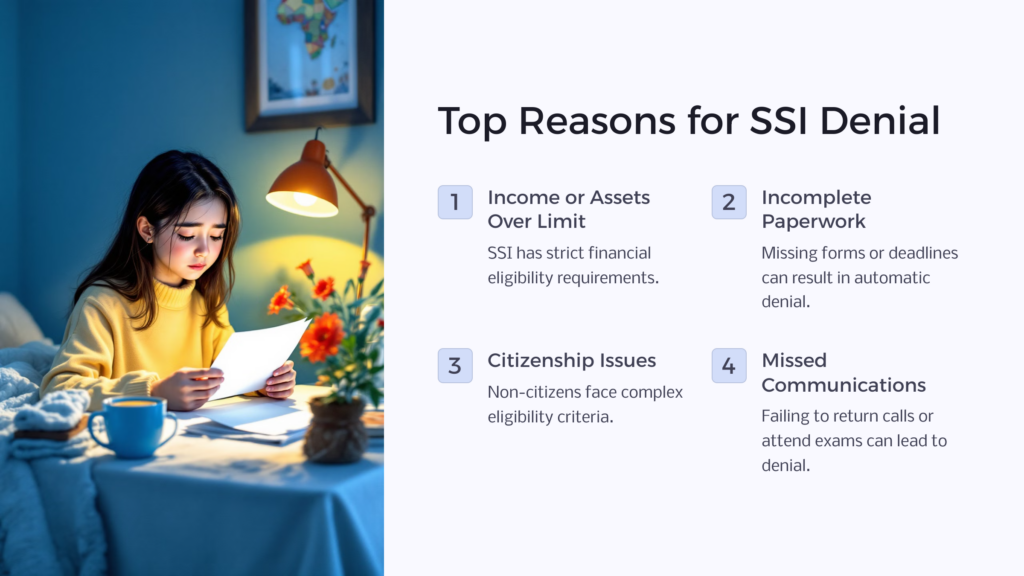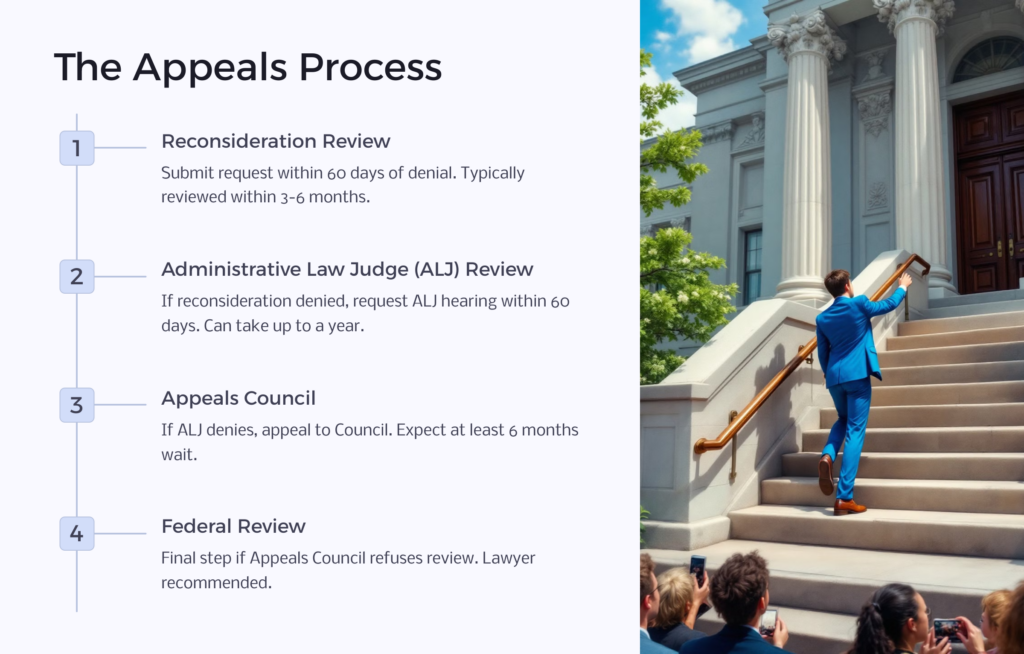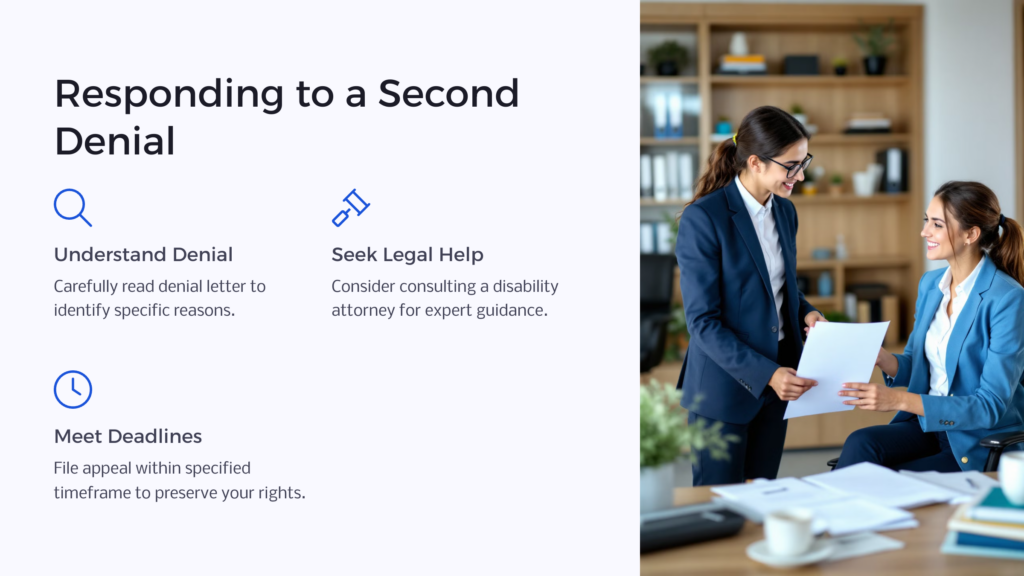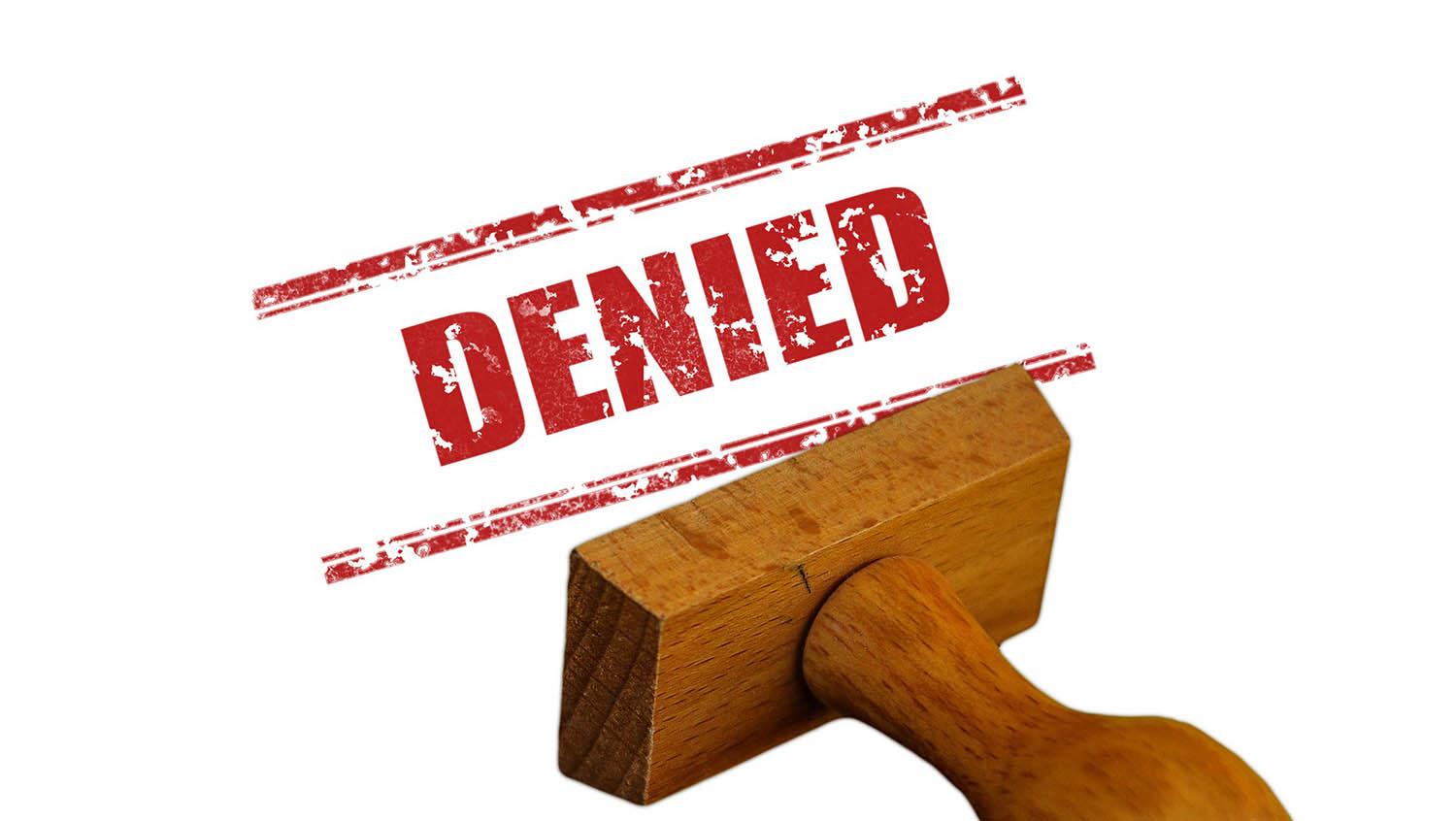If you’ve applied for Social Security Disability benefits, you may be surprised when a denial letter shows up in the mail. An initial denial is common—over 65% of claimants are turned down the first time. But that doesn’t make your situation any easier.

Should you file another disability application for Supplemental Security Income (SSI)? Is it worth hiring a disability attorney? How does the Social Security Appeals Process work, anyway? The answers depend, partly, on why you were denied.
Top 12 Reasons to Be Denied SSI Disability Benefits
- Your income or assets are over the limit
- Didn’t return necessary forms to SSA
- Denied SSI for not being a US citizen
- Failure to return important phone calls from SSA or the Disability Office
- Currently working–over the Substantial Gainful Activity (SGA) limits
- Didn’t return required questionnaires to the Disability Office
- Failed to attend the Consultative Exam (CE)
- You missed an important deadline
- SSA determined you could return to a previous job
- Denied because you are “too young”
- Your medical conditions would not last at least 1 year
- Your medical conditions were not severe enough
Some of the common denial reasons are easy to grasp and relatively easy to fix, like not having enough medical evidence. On the other hand, your denied claim may be related to your medical condition or your age, which can be harder to address. Or, the Disability Office that reviews the medical evidence may have decided your condition is likely to improve.
Since SSI eligibility is a combination of your income and your medical condition, you could have been denied by the SSA Office (where your claim got started) or the Disability Office (where the medical evidence was reviewed). Let’s explore the 12 most common reasons for denial of an SSI application – which account for about 90% of why all claims are denied.
1. Your income or assets are over the limit
To qualify for Title 16, a claimant’s financial resources must be low. (Title 16 is also known as the “welfare” benefit). You cannot have any SSI income (including income from investments) over $2,000. For example, you can’t own a rental property that takes in more than $2,000 in a year. “Assets” include:
- Household goods and personal effects (over $2,000)
- Stocks, mutual funds, or government bonds
- Cash, or funds in a checking account or savings account
- Life insurance policy cash value over $1,500
- Any real estate beyond one property (even if you don’t rent it out)
- More than one motor vehicle
It may feel like you hardly have any assets but when adding up cash, investments, and additional property many Americans easily go beyond the low SSA limits.
2. Didn’t return necessary forms to SSA
If you never received their paperwork it doesn’t matter—SSA may still deny your claim and you will have to begin the appeals process. The SSA office has strict deadlines for paperwork because there are already so many built-in delays in the application process.
The forms that SSA sends (or makes available online) are long, so some claimants decide to put off filling out the forms. Claimants sometimes become overly discouraged when they discover that missing forms might be the reason for a denied claim. But don’t fall into that trap! Part of what makes getting Supplemental Security Income so tough is negotiating the bureaucracy.
3. Denied SSI for not being a US citizen
In the case of Supplemental Security Income (SSI), the citizenship rules are complicated. These rules include eight categories defining what it means to be an “alien” (non-citizen). Also, your identity must align with one of many SSA conditions and their predefined criteria. The bottom line is, if you are not a full US citizen, the SSI approval criteria aren’t easy to understand, and any non-US citizen status will result in a denied claim. If you don’t have US citizenship, you still need a valid Social Security number to apply for SSDI.
4. Missed returning an important phone call from either SSA or Disability Office
Once you’ve filed an initial claim, you may receive a phone call from the SSA office or Disability Determination Services Office (DDS, or simply the “Disability Office”). The SSA office might call because your application is incomplete, or they need further verification of income. Once your claim is sent to the Disability Office where the medical determination is made, you may also get a phone call.
Disability Office caseworkers have different goals than SSA office workers. For example, they are not interested in your income but they may want to know about what kinds of work you did. There may be only one phone call, but if you fail to return their call or wait too long it can result in denial. Both offices operate within specific timeframes, so if you are unable to respond quickly it can cause problems when your claim is at a critical stage.
5. You are earning income and may be working over Substantial Gainful Activity (SGA) limits
To be eligible for SSI, you should not be earning money, as it will quickly put you above the SSI income limits. It is important to understand SGA, however, because some SSI applicants also apply under Title 2 (SSDI). For example, claimants who apply for SSI or SSDI may have few resources but do have a recent work history.
The SGA limit at the time you apply for disability is $1,200 per month. If you are earning beyond this amount when you are in the application process or once you’ve been approved, your SSI eligibility could be at risk. This applies mainly to SSDI (for SSI income limits, see bullet #1). As with many SSA rules, timing can be an issue here so you need to be aware of how long you can continue earning as you start the application process.
6. You failed to return a questionnaire to the Disability Office
The Disability Office gets a lot of information about your health status and impairments from you. Questionnaires they send out could ask you to report your daily activities, list recent medical procedures, or write down additional medical sources. The Disability Office sends out forms right after a caseworker is assigned, but sometimes this can translate into months after you initially applied or online. What’s more, they may send follow-up surveys at any point in the process.
7. You missed a scheduled Consultative Exam
Some people have very few medical sources, so the Disability Office can’t collect medical evidence. In these cases, they will schedule an exam with one of their doctors. They could schedule more than one appointment because some claims require a physical and psychological evaluation. For example, if you file a disability claim for anxiety or depression, you may need to attend a CE with a psychologist. Appointments may include labs, x-rays, or other specialized tests. If you fail to appear to a CE, your claim will likely be denied for insufficient evidence.
8. An important deadline was missed
Missed deadlines are usually related to the Appeals Process, which we’ll discuss in more detail later. After an initial denial, there are deadlines associated with the next three steps of appealing the denial. All of these have a 60-day deadline. It is important to strictly follow deadlines during the appeals process.
However, other important SSA deadlines can include the protective filing date, which is a written statement about intent to file a claim. Another common deadline relates to completing and returning paperwork in 10 days—often buried in paperwork that claimants don’t bother reading. It’s challenging for applicants to understand which “10-day” deadlines matter and which may not, as some Disability Office caseworkers will immediately deny a claim with a missed 10-day deadline and others may be a little more flexible.
9. SSA determined you could return to a previous job
Your ability to engage in some type of work (SGA) is the core definition of disability. If someone can work and earn money, they are considered not disabled. Do you have a work history or a skilled trade? If your limitations aren’t too severe, the Disability Office doctors may decide you can work, and your claim will be denied. You will be considered capable of returning to a prior job because your impairment doesn’t limit a certain amount of physical activity or mental effort.
10. Denied because you are “too young”
There isn’t a definite age limit on disability. Even children have claims that are approved. However, for people who have a debilitating chronic illness like back pain, depression, or osteoarthritis, age is a factor. Once you’ve reached 55 years, it’s far easier to win approval. This is based on a formula used by the Disability Office that assumes younger people are more capable of adapting to new job roles. If you are under 50, getting benefits may take longer and you will probably have more success when you present your claim to an Administrative Law Judge (ALJ).
11. Your medical conditions would not last at least 1 year
If your disabling condition will last for at least 12 months (or is expected to result in death), it meets a basic definition of “disabled.” Many illnesses and injuries, with medical treatment, have a positive prognosis. This is especially true with injuries and strokes, even if they are debilitating for the first few months. Other events, like heart attack, can be expected to improve within a year, or at least stabilize–making it possible to return to past work or do new work that isn’t as strenuous or demanding.
12. Your medical conditions were not severe enough
In some cases, a claim is approved quickly because it meets a specific disability threshold.
All analysis of disability starts with whether the condition “meets” an official listing, and there is one for almost every known medical condition. These are listed in a book called the POMS (for short). If your medical condition does automatically qualify, it will result in speedy approval.
Meeting a listing can often be determined with a single test or number. For example, an IQ test has a “cut off” and if you perform below that number you will meet the listing for intellectual disability. Most claims do not meet or equal listings but are determined through deeper analysis.
How to Appeal a Denial for SSI

Understanding the disability appeals process is key to learning how to get disability benefits. Only about one out of three claimants receive disability benefits at the initial claim level. After denial, you need to know what happens next. Many claimants decide to hire a disability attorney at this stage.
How Long to Appeal an SSI Denial?
After an initial denial, you can apply for Reconsideration Review by submitting an online request to the SSA office within 60 days (from the date of your denial letter). When a Reconsideration claim is denied, the next step is to apply online for an Administrative Law Judge (ALJ) review (again, within 60 days). Finally, if denied at the ALJ level, there is recourse to the Appeals Council. If the Appeals Council refused to review your claim, you can file for a Federal Review. A disability attorney is highly recommended for the last three steps (ALJ, Appeals Council, and Federal Review).
How Long After You File an Appeal Before the Case Will Be Heard?
With a Request for Reconsideration, there is a good chance your file will be reviewed within six months. Three months is not uncommon, depending on the backlog. For the ALJ, however, it is likely your case will not reach a judge for up to a year—but this depends a great deal on the backlog where you live. The Appeals Council and Federal Review vary widely but expect a wait of at least six months for each.
How Much Does It Cost to Appeal an SSI Denial?
There are no costs associated with an appeal after SSI denial. Should you decide to use an attorney, his or her fee will be a percentage of whatever money you are awarded in your benefits.
What if I was Denied Social Security for the Second Time?

If you’ve been denied Social Security Disability benefits for the second time, it can be disheartening. However, there are several steps you can take to increase your chances of success:
1. Understand the Denial Letter
Carefully read the denial letter, as it will provide insights into why your claim was denied. The letter should outline the specific reasons for the decision, such as lack of medical evidence or failure to meet the eligibility criteria. Understanding the reasons will help you strengthen your application.
2. Consult with an Attorney or Advocate
Consider seeking assistance from a disability attorney or advocate specializing in Social Security cases. These professionals have experience navigating the appeals process and can provide valuable guidance. They can review your case, identify potential issues, and even develop a strategy for your appeal.
3. File an Appeal within the Deadline
Filing your appeal within the deadline in the denial letter is crucial. Missing this deadline could mean you lose your right to appeal. Ensure that all necessary forms are completed accurately and submitted on time.
4. Gather Additional Evidence
Take the opportunity to gather any new or updated evidence to support your claim. This can include medical records, doctor’s notes, test results, and statements from healthcare providers. Ensure the evidence addresses the concerns raised in the denial letter and demonstrates the severity and impact of your condition.
5. Obtain a Residual Functional Capacity (RFC) Assessment
Request an RFC assessment from your healthcare provider. An RFC assessment evaluates your ability to perform work-related activities. This assessment can provide substantial evidence supporting your claim for disability benefits.
6. Consider a Consultative Examination
If you lack sufficient medical evidence in your case, you may request a consultative examination. This is an examination conducted by a medical professional appointed by the Social Security Administration. It can fill any gaps in your medical records and provide additional evidence to support your claim.
7. Prepare for a Hearing
If your appeal reaches the hearing stage, it is crucial to prepare thoroughly. Review your case file, gather any additional evidence, and consult with your attorney or advocate to develop a strong strategy. Practice answering potential questions during the hearing to ensure you present your case effectively.
8. Be Present at the Hearing
Attend the hearing in person and be prepared to present your case to an Administrative Law Judge. Dress appropriately and be respectful during the proceedings. Answer questions truthfully and explain your condition’s impact on your ability to work.
9. Stay Persistent and Seek Support
The appeals process can be lengthy and challenging, but it is essential to stay persistent. Seek support from friends, family, or support groups to help you. Remember that many successful disability claims are initially denie
but approved after the appeals process.
10. Consider Reassessing Your Claim with an Attorney
If your second appeal is also denied, consider reassessing your claim with the help of an attorney. They can review your case, evaluate potential legal options, and guide you on the best course of action.
Being denied Social Security Disability benefits for the second time can be discouraging, but it’s important to remember that many successful claims go through the appeals process. By understanding the reasons for denial, seeking professional assistance, gathering additional evidence, and presenting a strong case at a hearing, you increase your chances of overturning the denial and receiving the benefits you deserve. Stay persistent, be prepared, and don’t hesitate to seek support throughout the process.
Start Your SSI Appeal
You can obtain the appeal forms from a local Social Security office. You can also find the correct SSI appeal form and the accompanying Appeal Disability Report online at www.ssa.gov. You can either complete and submit the SSI Disability appeal online, or you can print the forms to complete and mail or deliver them to your local Social Security office.
You’ve been denied, and now you know what to do next. Action is empowering. Find your denial letter and begin applying for the next step in the appeals process. Whatever the reason your claim was denied, there is plenty to do to increase your chances of SSI approval next time. Benefits.com is here to help!
 Benefits.com Advisors
Benefits.com Advisors
With expertise spanning local, state, and federal benefit programs, our team is dedicated to guiding individuals towards the perfect program tailored to their unique circumstances.
Rise to the top with Peak Benefits!
Join our Peak Benefits Newsletter for the latest news, resources, and offers on all things government benefits.




















